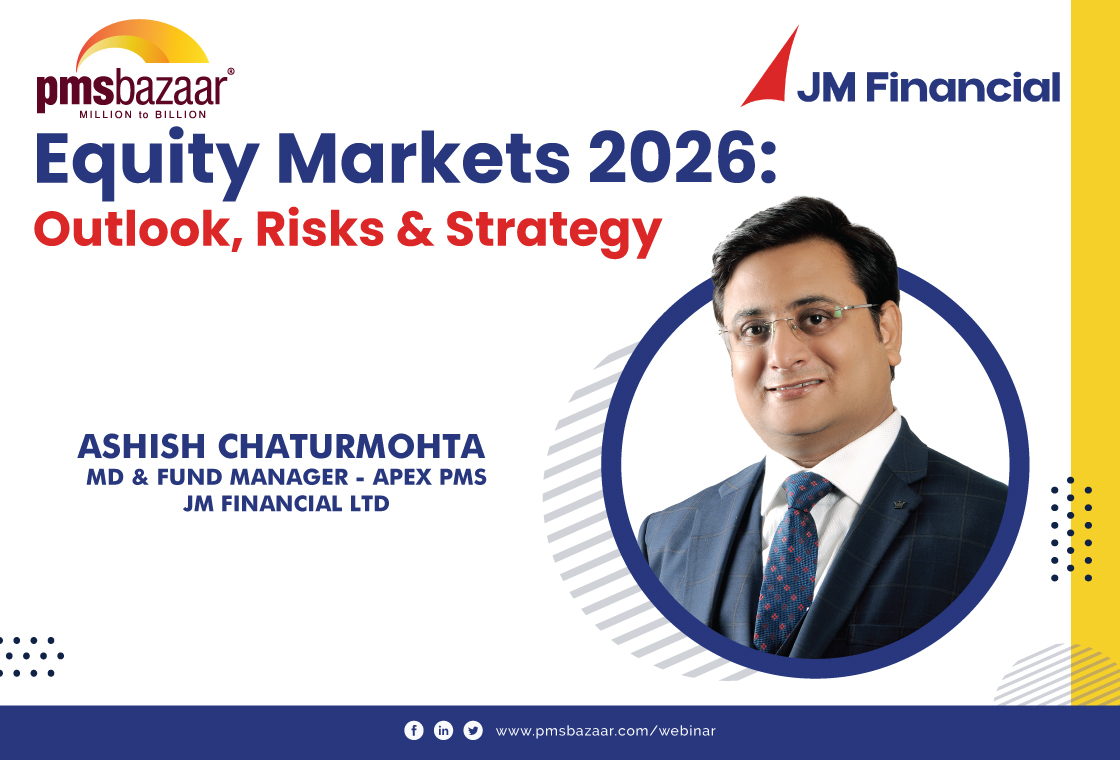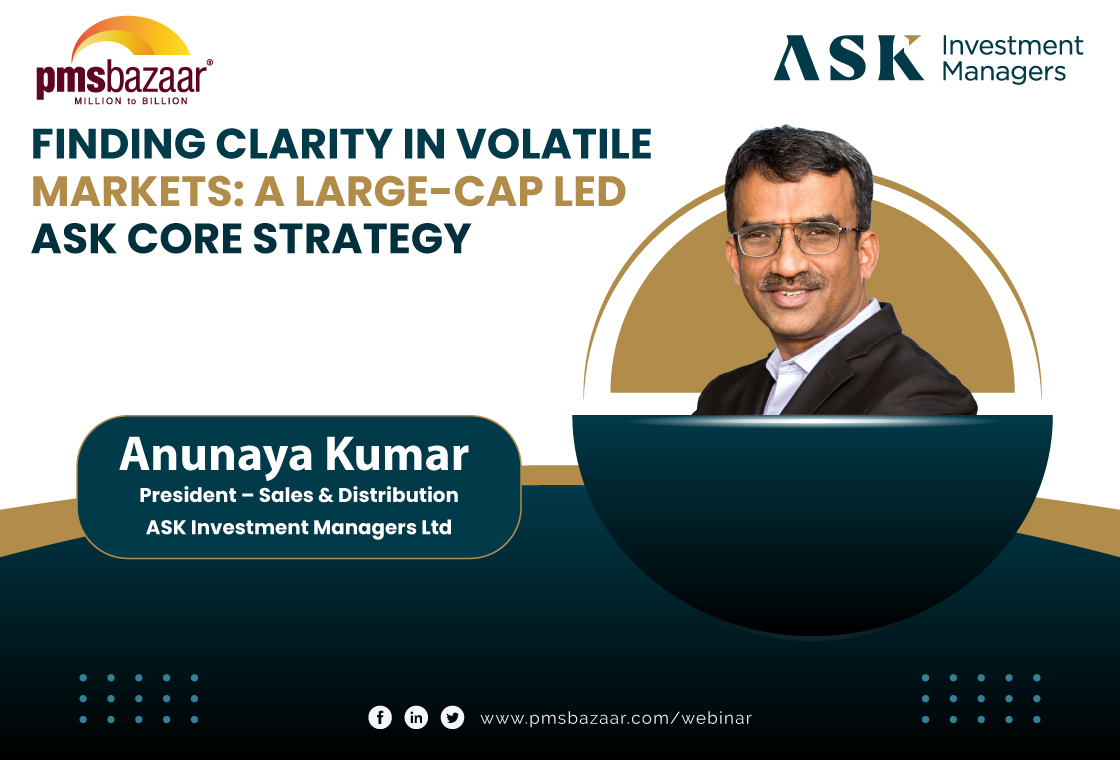PMS Bazaar recently conducted an Exclusive Interview with Mr.Madanagopal Ramu, Head – Equity & Fund Manager of PMS Bazaar. This Interview is a Part of our Special Interview series, which will offer valuable insights from leading industry experts. In this Blog, we have extracted some key insights from the exclusive session for you to gain quality investment insights.

Excerpts from the interview:
Pressure on Nifty: Downtrend Analysis
Based on
my understanding, you are asking about the reason behind the current downtrend
and the effect of inflation, interest rates, and Nifty. I think a lot of time
is spent discussing these topics, but the primary concern should be whether
inflation will remain high for the next two to three years. The inflation rate
was high last year due to a supply-side shock caused by the pandemic. However,
most supply-side issues have been addressed, and we see a fall in commodity
prices. The US and China's recovery are also not reflecting any significant
increase in commodity prices. Still, shelter prices are high, keeping inflation
sticky. However, the labor market is still strong, and shelter prices can
decrease in the next two to three months.
If we take
a two to three-year view, inflation will likely be normal. Hence, investors
should focus on buying stocks with a long-term view, considering the market's
current valuations. The Nifty is currently at a reasonable valuation, trading
at around 18 to 20 times, and it is likely to remain at a consolidation phase
or minor drift in the next six months. Assuming the Nifty's earnings to be
around 1,000 to 1,050, the market could trade between 18 to 20 times, resulting
in a forward index of 19,500 to 20,000 levels. The downside risk of the Nifty
is protected at around 16,500 levels, and a maximum correction of 5% is
expected.
However,
one should note that portfolios with a 25 to 30 percent overlap with the Nifty
may not follow the index. Hence, it is essential to look at different sets of
stocks depending on their growth potential and current valuations. In
conclusion, investors should focus on long-term investments and avoid being
swayed by short-term market movements.
Investing in Growth Companies Beyond the Benchmark
India has
added a $3.5 trillion economy since independence and is expected to add another
$3.5 trillion over the next eight years. However, this new India will be
different from what has been built. Two areas where considerable change is
expected are consumption and investment. In the consumption basket, consumer
discretion is expected to grow, which has happened in every country after
reaching a certain level of per capita income. According to Mr. Ramu, “From
a growth perspective, consumer discretionary will likely beat FMCG companies
and the auto sector. There is hardly any other consumer discretionary stock to
play in the Nifty, but it is a fast-growing space, so investors need to look
beyond the Nifty. In the Pharma sector, growth has been struggling for many
years, and even today, we don't see any consolidation happening in this space.
Therefore, there are no restrictions on investing in the Pharma sector, and
investors should consider sectors like specialty chemicals, which are not in
the Nifty but are in the mid-term small-cap space.” Any commodity
companies or utility companies' growth has been very poor over the last few
years. During the COVID-19 period, due to supply shocks, metals did well, but
from here, there is no great push for the metal inflation index unless China
surprises us.
Therefore,
metals are not a space for long-term investors. Investors should be tactical
and get in and out at the right time. In the power sector and telecom, there
have been short-term benefits due to consolidation, but otherwise, there is not
much growth expected. The internet space is also not expected to grow beyond
single digits. Investors need to look for growth companies beyond the Nifty but
keep an eye on corporate governance and balance sheet quality. Many mid and small-cap
sectors are not growing, so investors need to be selective.
The
banking sector may have short-term pain due to the liquidity being taken out
and interest rates rising sharply. It should not be a cause for long-term
concern. Market corrections are an opportunity, and while there may be issues
with risk management in certain financial institutions, central bankers have
many tools at their disposal to handle any potential crisis. However, the
global market's struggle with growth may have a more significant impact on
India's export story, especially in the IT sector, which may grow at a slower
rate and may not meet the criteria for investment. Overall, while there may be
some short-term challenges, India's banking sector should not be a cause for alarm
in the long run.
Qualities
to Possess as an Aspiring Fund Manager
As an
aspiring fund manager, there are several qualities that you should strive to
possess, but here are three important ones:
- Strong analytical skills: An effective fund manager requires a deep understanding of financial markets, securities, and economics. You need to be able to analyze data, research companies, and interpret market trends to make informed investment decisions.
- Good communication skills: As a fund manager, you must communicate investment strategies, performance updates, and other important information to clients, stakeholders, and team members. Strong communication skills are essential for building relationships and trust with investors.
- Discipline
and patience: Successful fund
managers have a disciplined and patient approach to investing. They understand
that investing is a long-term game and don't get swayed by short-term market
fluctuations. They stick to their investment strategy and remain focused on
their long-term goals, even during challenging times.
In the interview, Mr.
Madanagopal Ramu discussed several other questions in detail. Watch the full interview with the link appended below -
Get access to rich data and analytics of PMS & AIF by subscribing to us. Join the 48000+ investors & experts now: Subscribe NOW
Recent Blogs

Equity Markets 2026: Outlook, Risks and Strategy
PMS Bazaar recently organized a webinar titled “Equity Markets 2026: Outlook, Risks and Strategy,” which featured Mr. Ashish Chaturmohta, MD & Fund Manager – APEX PMS, JM Financial Limited. This blog covers the important points shared in this insightful webinar.

MICRO CAPS: The Dark Horses of the Indian Equity Market
PMS Bazaar recently organized a webinar titled “MICRO CAPS: The Dark Horses of the Indian Equity Market,” which featured Mr. Rishi Agarwal and Mr. Adheesh Kabra, both Co-Founders and Fund Managers, Aarth AIF. This blog covers the important points shared in this insightful webinar.

Finding Clarity in Volatile Markets: A Large-Cap Led ASK CORE Strategy
PMS Bazaar recently organized a webinar titled “Finding Clarity in Volatile Markets: A Large-Cap Led ASK CORE Strategy,” which featured Mr.Anunaya Kumar, President – Sales and Distribution ASK Investment Managers Limited. This blog covers the important points shared in this insightful webinar.
.jpg)
Passively Active Investing — A Modern Investor’s Lens on ETF-Based PMS
PMS Bazaar recently organized a webinar titled “Passively Active Investing — A Modern Investor’s Lens on ETF-Based PMS,” which featured Mr. Karan Bhatia, Co-Founder and Co-Fund Manager , Pricebridge Honeycomb ETF PMs. This blog covers the important points shared in this insightful webinar.

Spot the Trouble: Red Flags in Equity Investment Analysis
PMS Bazaar recently organized a webinar titled “Spot the Trouble: Red Flags in Equity Investment Analysis,” which featured Mr. Arpit Shah, Co-Founder & Director, Care Portfolio Managers. This blog covers the important points shared in this insightful webinar.

Long-Only AIFs Rebound Sharply in October; Long-Short Strategies Lag Despite Lower Volatility
106 long-only AIFs averaged 3.68% vs 32 long-short AIFs at 2.7%; only 24–31% of funds beat key indices

Markets log strongest monthly gains in 7 months; PMS performance turns near-uniform in October
Nifty 50 TRI gained 4.62%, BSE 500 TRI rose 4.27%; 415 of 427 equity PMSes ended positive

How SMEs are Shaping India’s Investment Landscape?
PMS Bazaar recently organized a webinar titled “How SMEs are Shaping India’s Investment Landscape?” which featured Mr. Shrikant Goyal, Fund Manager, GetFive Opportunity Fund.

